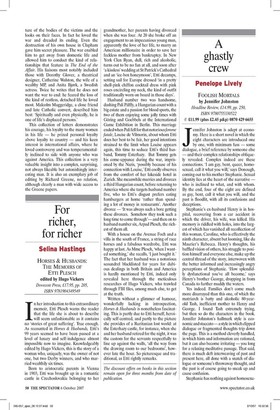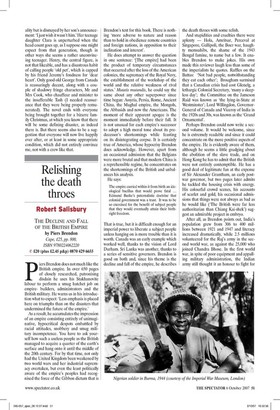A ghastly crew
Penelope Lively FOOLISH MORTALS by Jennifer Johnston Headline Review, £14.99, pp. 250, ISBN 9780755330522 © £11.99 (plus £2.45 p&p) 0870 429 6655 Jennifer Johnston is adept at economy. Here is a short novel in which the eight characters are introduced one by one, with minimum fuss — some dialogue, a brief reference by someone else — and their complex relationships obliquely revealed. Complex indeed are these connections. 'I am gay, bent, queer, homosexual, call it what you will, says Donough, coming out to his mother Stephanie. Sexual identity lies at the heart of the narrative — who is inclined to what, and with whom. By the end, four of the eight are defined as gay, bent, call it what you will, and the past is floodlit, with all its confusions and deceptions.
Stephanie's ex-husband Henry is in hospital, recovering from a car accident in which the driver, his wife, was killed. His memory is riddled with holes, into the largest of which has vanished all recollection of this woman, Caroline, who is effectively the ninth character, absent but looming, like du Maurier's Rebecca. Henry's thoughts, his baffled vision of others, his struggle to position himself and everyone else, make up the central thread of the story, interwoven with the better informed and increasingly angry perceptions of Stephanie. 'How splendidly dysfunctional you've all become,' says Henry's brother George, dropping in from Canada to further muddy the waters.
Yes indeed. Families don't come much more disarrayed than this one, of which the matriarch is batty and alcoholic 80-yearold Tash, inefficient mother to Henry and George. I found Tash extremely trying, but then so do the characters in the book. Jennifer Johnston's hallmark style is economic and staccato — a style in which clipped dialogue or fragmented thoughts trip down the page. This is a method cleverly handled, in which hints and information are rationed, but it can also become irritating — you long for a relaxing meditative passage. That said, there is much deft interweaving of past and present here, all done with a snatch of dialogue or someone's throwaway thought, and the past is of course going to sneak up and cause confusion.
Stephanie has nothing against homosexuality but is dismayed by her son's announcement: 'I just wish it wasn't him ' Her teenage daughter Clara is unperturbed when the head count goes up, as I suppose one might expect from that generation, though in other ways she seems a rather unconvincing teenager. Henry, the central figure, is not that likeable, and has a disastrous habit of calling people 'old pet', which is capped by his friend Jeremy's fondness for 'dear heart'. Only good old George from Canada is reassuringly decent, along with a couple of shadowy fringe characters, Mr and Mrs Cook, who chauffeur and minister to the insufferable Tash (I needed reassurance that they were being properly remunerated). The novel ends with everyone being brought together for a bizarre family Christmas, at which you know that there will be some defining disaster, as indeed there is. But there seems also to be a suggestion that everyone will now live happily ever after, or at least in some appropriate condition, which did not entirely convince me, not with a crew like that.






























































 Previous page
Previous page